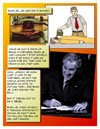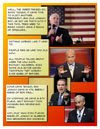
Today's NYT had an article about a strange, grim lottery taking place in Oregon.
Ninety-one thousand Oregon residents have put forth their names into this lottery in order to win health care. The state lottery has slots for only 7,000 Oregonians. Those aren't good odds.
Many people visit the area around Bend, Oregon, for recreation, for Bend is unusually-blessed with volcanoes and forests and wild rivers. What these vacationers don't realize is that almost 20% of the people living in the region do not have health care.
What does it mean to not have health care in modern America?
Not so long ago, Mr. Bush proclaimed, “I mean, people have access to health care in America. After all, you just go to an emergency room.”
What this misstatement ignores is the fact that once an emergency room saves your life, you still get the bill. Even a brief hospitalization can quickly accrue hundreds of thousands of dollars. For many people in the income brackets that tend to not have health care, such a bill is so far beyond their ability to ever pay that might as well be for a trillion dollars. A sickness then, even if one recovers, becomes a life-ending event.
What Mr. Bush's statement also misses is the fact that by waiting until the last minute to go to an emergency room, by waiting until the pain is unbearable, or the victim has lost consciousness, diseases that were easily treatable become untreatable. Diagnoses that could stave off later problems are not made. People die because they do not have health insurance, despite Mr. Bush's snide assurances.
Oregon's lottery is about more than just getting health care. It is literally a matter of life and death.
What kind of society decides the life and death of its citizens by chance?
Shirley Jackson answered this question in her famous story, "The Lottery." (Although everyone knows "The Lottery," I think Shirley Jackson's book We Have Always Lived in the Castle is even more worthwhile.)
In "The Lottery," a small-town meeting turns out to be a gathering for human sacrifice, the victim of which is selected by lot. There is never any reason stated for the murder in this town; it is simply tradition. And this is the real meaning for modern America: There is no rational reason for people in Oregon to have to wager for their lives. There is no rationale, no defensible argument one can make, for Americans not to have universal health care.
reason stated for the murder in this town; it is simply tradition. And this is the real meaning for modern America: There is no rational reason for people in Oregon to have to wager for their lives. There is no rationale, no defensible argument one can make, for Americans not to have universal health care.
We Americans now are as superstitious as the Shirley Jackson's villagers. As long as we cling, through tradition and fear, to our dangerous and cruel practices, we are no better than savages cutting-out human hearts to appease a blood-thirsty god--in fact, we are worse, because we know there is no such god and yet still perform the sacrifice.

I am an alumnus of Cal State Hayward, which is now officially known as Cal State East Bay, although no alumni call it by that name. As an alumnus, today I feel quite ashamed of the actions of CSUH in regards to one of its teachers, Marianne Kearney-Brown.
Ms. Kearney-Brown is a veteran math teacher--a instructor, in other words, in a field in which everyone seems to agree there is a desperate shortage of qualified teachers. But rather than encouraging her academic pursuits, CSUH fired her for inserting the word "non-violent" in her loyalty oath.
Loyalty oaths?
Weren't those something out of the McCarthy era? Well, yes. What possible reason could there be for a loyalty oath today? Well, none, of course. But once bureaucratic instruments are in place, they have a strange longevity; perhaps this is because administrators fiercely defend their work. If they didn't have forms to fill-out and loyalty oaths to collect, why would a school need to have petty administrators on the payroll? Therefore, the forms and oaths must stay so that they can keep their jobs. None of this, of course, has anything to do with the business of running a university, and constitutes a steady and completely-unnecessary drain on school resources and the time of of those teachers who actually do the work of the school.
You would think that, in 2008, loyalty oaths would be a thing of the past, if for no other reason than the publication of Joseph Heller's Catch-22, one of the greatest books of the 20th century. (I also think Heller's Something Happened deserves similar accolades, although this book is far less read, perhaps because it is so tragic, so heart-rending, and so true that few readers can stand its bleak portrait of the meaningless suffering of life.)
In Catch-22, Heller skewers military and bureaucratic life. This book is so good that during Vietnam soldiers had their copies of Catch-22 confiscated; there probably is no higher praise for an intellectual than to be banned by the American military. In Catch-22, one of the legion of petty bureaucrats governing the lives of Air Force men comes up with the idea of making all the men sign loyalty oaths. Almost overnight the Glorious Loyalty Oath Crusade was in full flower, and Captain Black was enraptured to discovering himself spearheading it. He had really hit on something. All the enlisted men and officers on combat duty had to sign a loyalty oath to get their map cases from the intelligence tent, a second loyalty oath to receive their flak suits and parachutes from the parachute tent, a third loyalty oath for Lieutenant Balkington, the motor vehicle officer, to be allowed to ride from the squadron to the airfield in one of the trucks. Each time they turned around there was another loyalty oath to be signed. They signed a loyalty oath to get their pay form the finance officer, to obtain their PX supplies, to have their hair cut by the Italian barbers ... When other officers had followed his urging and introduced loyalty oaths of their own, he went them one better by making every son of a bitch who came to his intelligence tent sign two loyalty oaths, then three, then four; then he introduced a pledge of allegiance, and after that 'The Star-Spangled Banner," one chorus, two choruses, three choruses, four choruses."
One of the more depressing things in life for me is that fact that even when someone like Heller so brilliantly flays open ludicrous incompetence, that ludicrous incompetence pops up in another form, another way, another time. Liberal education posits that by reading great literature or seeing great art, people will become educated, changed for the better. This is true in some cases. But most people do not listen; they merely wait until it is their turn to talk. People do not learn; they merely read the required material in order to pass the test, hating every minute of it, and absorb none of its truths. The idea of "speaking truth to power" is doomed because administrative power is deaf.
"Without realizing how it had come about, the combat men in the squadron discovered themselves dominated by the administrators appointed to serve them. They were bullied, insulted, harassed and shoved about all day long by one after the other. When they voiced objection, Captain Black replied that people who were loyal would not mind signing all the loyalty oaths they had to. To anyone who questioned the effectiveness of the loyalty oaths, he replied that ... the more loyalty oaths a person signed, the more loyal he was."
"...he returned and found his way blocked by a wall of officers waiting in line to sign loyalty oaths. At the far end of the food counter, a group of men who had arrived earlier were pledging allegiance to the flag, with trays of food balanced in one hand, in order to be allowed to take seats at the table. Already at the tables, a group of that arrived still earlier was singing "The Star-Spangled Banner" in order that they might use the salt and pepper and ketchup there."
In the case of Marianne Kearney-Brown, she did not refuse to sign the loyalty oath. She merely followed her religious convictions by altering the oath to specify non-violence as her form of protecting the Constitution. Ms. Kearney-Brown is a Quaker, a pacifist group whose non-violent ways were respected even during WWII (although not WWI). But now we have the War of Terror. Religious pacifism isn't patriotic enough for post-9/11 CSUH. Violence is required, even of math teachers.
When scientists went to war in the Manhattan Project, the military was concerned that they were insufficiently ready to defend their country by physical force. It never came to Nobel-laureate physicists being forced to do push-ups in the mud at Los Alamos, but it nearly did. Richard Feynman recalls a mock calisthenic/calculus drill where the physicists were harangued with, "Men! Pencils out! Pencils at the ready! On the mark, integrate!"
One hopes that Ms. Kearney-Brown will settle with CSUH for a large sum of money. However, only someone who has not read Catch-22 thinks that anything will actually change.


























